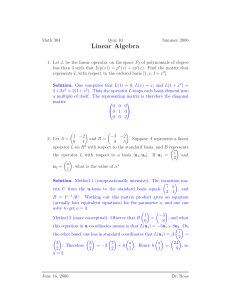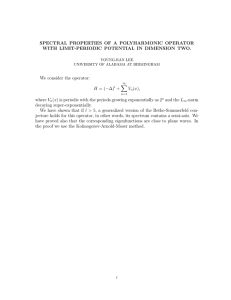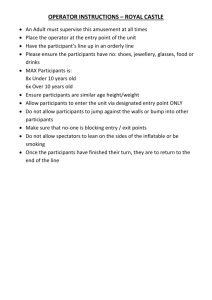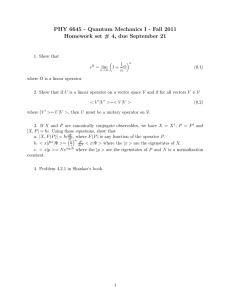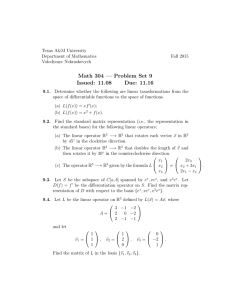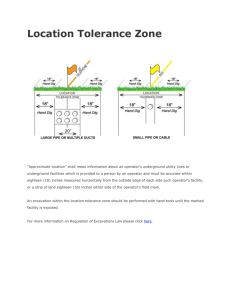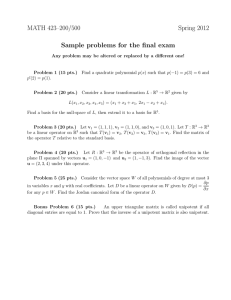Statistics 495, Applied Statistics for Industry I Name:____________________ Exam 1, Fall 2008
advertisement
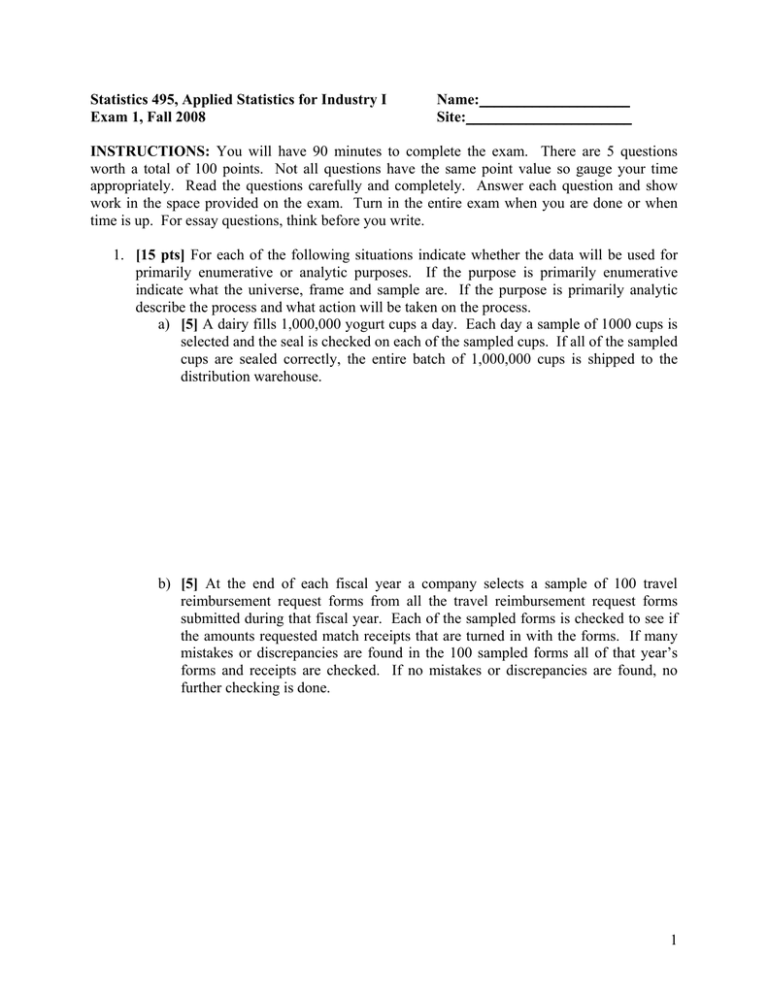
Statistics 495, Applied Statistics for Industry I Exam 1, Fall 2008 Name:____________________ Site:______________________ INSTRUCTIONS: You will have 90 minutes to complete the exam. There are 5 questions worth a total of 100 points. Not all questions have the same point value so gauge your time appropriately. Read the questions carefully and completely. Answer each question and show work in the space provided on the exam. Turn in the entire exam when you are done or when time is up. For essay questions, think before you write. 1. [15 pts] For each of the following situations indicate whether the data will be used for primarily enumerative or analytic purposes. If the purpose is primarily enumerative indicate what the universe, frame and sample are. If the purpose is primarily analytic describe the process and what action will be taken on the process. a) [5] A dairy fills 1,000,000 yogurt cups a day. Each day a sample of 1000 cups is selected and the seal is checked on each of the sampled cups. If all of the sampled cups are sealed correctly, the entire batch of 1,000,000 cups is shipped to the distribution warehouse. b) [5] At the end of each fiscal year a company selects a sample of 100 travel reimbursement request forms from all the travel reimbursement request forms submitted during that fiscal year. Each of the sampled forms is checked to see if the amounts requested match receipts that are turned in with the forms. If many mistakes or discrepancies are found in the 100 sampled forms all of that year’s forms and receipts are checked. If no mistakes or discrepancies are found, no further checking is done. 1 c) [5] Over several years the company using the audit described in b) has found no mistakes or discrepancies. On the basis of this, the company implements the policy that receipts for items less than $50 do not have to be submitted with travel reimbursement request forms. 2. [10 pts] For each of the following situations identify common and special cause variation that might exist in the process. a) [5] Every Tuesday morning I put my garbage cans out next to the road for pick up. The garbage truck comes around 8 am, a little earlier or later depending on how much garbage is left out at houses on the route. Occasionally, I come home at 6 pm and the garbage has not been picked up. This happens because of short staffing due to illness. b) [5] The commute time from my house to work is approximately 10 minutes give or take a few minutes for hitting, or not hitting, the lights right. On my regular route there is a level railroad crossing. The railroad tracks are used but not on a regular schedule. If I have to stop for the train, it adds another 5 minutes to the commute (either waiting for the train or taking an alternate route). 2 3. [25 pts] On the next two pages of the exam there are two sheets of graphs. One sheet has six run charts (numbered 1-6). The other sheet has four histograms (lettered A-D). • For each run chart choose the histogram that matches. You will have to use some histograms more than once. • For each pair (run chart and histogram) comment briefly on what the graphs tell you about the process. Be sure to describe each graph briefly and comment on how the two graphs give similar or different impressions of the process. Run Chart Histogram Comments 1 2 3 4 5 6 3 Run chart 2 100 100 80 80 Measurement Measurement Run chart 1 60 40 20 60 40 20 0 0 0 10 20 30 40 50 0 10 20 Rows 40 50 30 40 50 30 40 50 Run chart 4 100 100 80 80 Measurement Measurement Run chart 3 60 40 60 40 20 20 0 0 0 10 20 30 40 0 50 10 20 Rows Rows Run chart 5 Run chart 6 100 100 80 80 Measurement Measurement 30 Rows 60 40 20 60 40 20 0 0 10 20 30 Rows 40 50 0 0 10 20 Rows 4 Histogram A Histogram B 14 12 15 8 10 6 Count Count 10 4 5 2 0 20 40 60 80 0 100 20 Histogram C 40 60 80 Histogram D 30 Count 15 Count 0 20 40 60 100 80 20 10 10 5 100 0 20 40 60 80 100 5 4. [30 pts] An injection molding process produces plastic squirrel cage fans. The quality characteristic is the stiffness of the cage fan. A gauge is used to measure the deflection of the fan under a 10-pound load. This deflection measure is used to quantify stiffness. The smaller the deflection is the greater the stiffness, and vice versa. A gauge R&R study was performed using six operators (A, B, C, D, E and F) measuring five fans. Each operator measured the deflection of each fan three times. Below are the ranges and means of the three repeat measurements. Ranges of repeat measurements Part 1 2 3 4 5 Operator A 5 2 2 3 2 Operator B 8 0 4 3 0 Operator C 4 2 4 3 2 Operator D 3 3 0 7 2 Operator E 2 3 2 0 4 Operator F 3 6 5 4 5 Operator C 87 86 87 86 86 Operator D 86 81 85 84 82 Operator E 89 83 94 87 87 Operator F 87 82 89 86 84 Means of repeat measurements Part 1 2 3 4 5 Operator A 83 83 84 84 84 Operator B 89 87 88 84 90 a) [15] Compute estimates of the variance attributable to repeatability and reproducibility. Also, report the percentage of total measurement variability attributable to each of these components. 6 b) [5] JMP is used to analyze the same data (remember that JMP uses a different method to estimate the variance components than the one you used in a). From the JMP output, reproduced below, report the variability attributable to repeatability and reproducibility as a percentage of total measurement variability. Component Part-to-Part Reproducibility Repeatability Total Variance Component Estimate Percent of Total 1.9567 5.2667 3.8000 11.0234 17.75 47.78 34.47 100.00 c) [5] What is producing the most variability, the production process or the measurement process? Support your answer with information from the JMP output above. d) [5] Given your answer in c), what should be the focus for quality improvement? Explain briefly. 7 5. [20 pts] After a tough evening of studying statistics your mind turns to thoughts of food, specifically pizza. This question deals with the home delivery of pizza. a) [5] There are many factors that can affect the time it takes to deliver a pizza to your home. List several possible causes under the general category of Environment that might affect delivery time. b) [5] Refer to the Pareto chart of complaints. What are the “significant few” complaints and what percentage of total complaints do they account for, individually and together? 100 200 90 60 50 100 40 30 50 20 Other Upside down Wrong size Wrong order Late 10 0 Cold Count 70 Cum Percent 80 150 0 Complaint 8 c) [5] Refer to the Histogram of delivery times. Describe the center, spread and shape of the distribution. 12 10 6 Count 8 4 2 0 10 20 30 40 50 60 d) [5] Refer to the Run Chart of delivery times. Comment on trends or unusual values. 60 Delivery Time (mins) 50 40 30 20 10 0 0 5 10 15 20 Days 1, 8, 15 and 22 are Mondays 25 30 9
